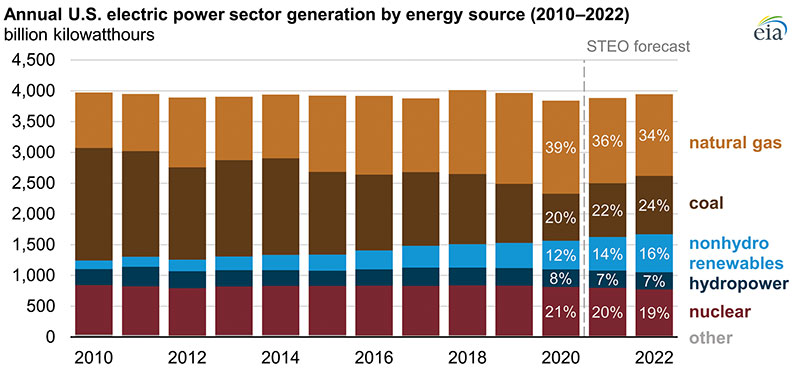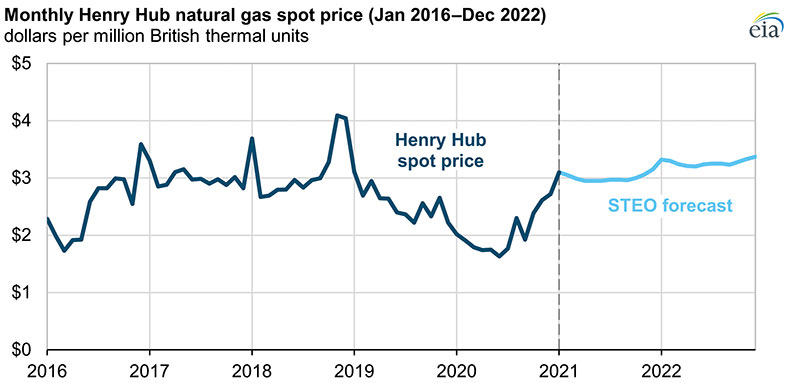February 2021, Vol. 248, No. 2
Global News
Global News February 2021
EIA Projects Less Power Generation from Natural Gas on Higher Prices
In its latest short-term forecast, the U.S. Energy Information Administration (EIA) projected that that the 2021 annual natural gas spot price at the Henry Hub will rise 98 cents per million British thermal units (MMBtu) to average $3.01/MMBtu.
The EIA expects higher natural gas prices will prompt dry natural gas production to increase in the second half of 2021, after reaching a monthly low of 87.3 Bcf/d in March 2021. On an annual basis, EIA forecasts that dry natural gas production will decline to an average of 88.2 Bcf/d in 2021 from 90.8 Bcf/d in 2020. Since early 2020, natural gas production has fallen amid low natural gas and crude oil prices.
EIA forecasts that generation from natural gas-fired power plants in the U.S. electric power sector will decline by about 8% in 2021. This decline would be the first annual decline in natural gas-fired generation since 2017. Forecast generation from coal-fired power plants will increase by 14% in 2021, after declining by 20% in 2020. EIA forecasts that generation from non-hydropower renewable energy sources, such as solar and wind, will grow by 18% in 2021 – the fastest annual growth rate since 2010.
The shift from coal to natural gas marked a significant change in the energy sources used to generate electricity in the United States in the past decade. This shift was driven primarily by the sustained low natural gas price. In 2020, natural gas prices were the lowest in decades; the nominal price of natural gas delivered to electric generators averaged $2.37 per MMBtu. For 2021, EIA forecasts the average nominal price of natural gas for power generation will rise by 41% to an average of $3.35 per million Btu, about where it was in 2017. In contrast, EIA expects nominal coal prices will rise just 6% in 2021.
EIA expects about 36% of total U.S. electricity generation in 2021 will be fueled by natural gas, down from 39% in 2020. The forecast coal-fired generation share in 2021 rises to 22% from 20% last year. However, these forecast generation shares are still different from 2017, when natural gas and coal each fueled 31% of total U.S. electricity generation.
France’s Total Drops API Membership Over Climate, Political Differences
Total announced that it decided not to renew its membership in the American Petroleum Institute (API) after assessing “the main industry associations of which it is a member to ensure they are aligned with the Group’s climate positions.”
“Following the 2019 and 2020 reviews, API’s positions were assessed as ‘partially aligned’ with those of the Group,” Total said, but “certain divergences, which have been discussed within the association, remain today.”
Total cited API’s support for the rollback of U.S. regulation on methane emissions, its opposition to subsidies for electric vehicles and differing positions regarding the carbon pricing principle. It also noted API’s support in recent elections of candidates who argued against U.S. participation in the Paris Agreement.
An API spokesperson thanked Total for its past participation in “this critical forum for our industry.”
“We believe that the world’s energy and environmental challenges are large enough that many different approaches are necessary to solve them, and we benefit from a diversity of views,” the API spokesperson said. “As a member-driven organization, we do not support subsidizing energy because it distorts the market and ultimately proves harmful to consumers. Our industry’s focus continues to be on taking meaningful action and shaping policy at all levels of government to reduce U.S. emissions and ensure access to affordable and reliable energy.”
Croatia Diversifies Gas Supply with New LNG Terminal
Croatia’s LNG terminal on the northern Adriatic island of Krk began operations with the first delivery from the United States on Jan. 3, according to LNG Hrvatska, the company which runs the unit.
“LNG tanker Tristar Ruby anchored with 143,000 cm of gas which signifies the beginning of the commercial use of the terminal,” LNG Hrvatska director Hrvoje Krhen told the state news agency Hina.
The Krk terminal diversifies supply for Croatia, which has mostly relied on Russian gas and its own production, but also for some other countries in central Europe including Hungary. The Krk floating LNG terminal has a capacity of 2.6 Bcm per year.
LNG from Baltic States Gains Ground in Finland, Data Shows
Gazprom has lost a third of its share of the Finnish gas market after the new Balticconnector pipeline opened imports via the Baltic States, according to data from Gazprom and Estonian gas grid operator Elering.
The Balticconnector pipeline links Finland and Estonia and can also send gas to the Baltics. In the first nine months of 2020, a total of 5.8 terawatt-hours (TWh) of gas was exported to Finland via the pipeline, data provided by Elering showed.
Meanwhile, direct gas exports from Russia to Finland over same period dropped by 35% to 11.4 TWh, from 17.6 TWh over Jan.-Sept. in 2019, Gazprom’s quarterly data, published on its website, showed.
Natural gas prices between Finland and the Baltic states of Estonia, Latvia and Lithuania vary due to their access to the global LNG market, ability to store gas in Latvia and different Russian gas supply contracts.
Built to transport about 25 TWh of gas per year, Balticconnector has been limited so far by delays in the planned upgrades of compressor stations.
Serbia Opens Section of Turkstream Pipeline Against U.S. Opposition
Defying U.S. calls to reduce its dependency on energy supplies from Russia, Serbia officially launched a new gas link to bring additional Russian gas to the Balkan country via Bulgaria and Turkey.
Serbian President Aleksandar Vucic attended a ceremony in January for the opening of the 250-mile (400-km) section of the Turkish Stream (Turkstream) pipeline, saying that Serbia has become “much richer” thanks to the new Russian energy supplies.
Like the almost-completed Nord Stream 2 pipeline that is to double Russian gas supplies to Germany, Turkstream was threatened by U.S. sanctions against companies involved in the project.
Serbia depends almost entirely on Russian energy supplies. Washington has been urging Serbia to diversify its energy supplies and use and American LNG shipments. Although Serbia has been formally seeking European Union membership, it has also been strengthening its ties with traditional Russia as well as with China.
Court Approves Williams’ Deal with Bankrupt Chesapeake
Tulsa-based pipeline operator Williams announced that a bankruptcy court has approved its agreement to take ownership of some Chesapeake Energy assets in exchange for accepting lower gas gathering fees.
As part of that agreement, Williams said, it received a payment of $112 million from Chesapeake upon court approval related to all pre-petition and past due receivables associated with midstream expenses per the existing contracts. Chesapeake agreed that it will make no attempt to reject Williams’ gathering agreements in the Eagle Ford, Marcellus or Mid-Con areas.
Williams agreed to reduce its gathering fees in the Haynesville in exchange for gaining partial ownership in Chesapeake’s 50,000 net South Mansfield mineral acres. Additionally, Chesapeake will enter into a long-term gas supply commitment of a minimum 100 Mdth/d and up to 150 Mdth/d for Williams’ Transco Regional Energy Access (REA) pipeline currently under development.
Williams noted that the reduced gathering fees under the agreement are consistent with incentive rates it has offered in the past to attract drilling capital, and are “therefore expected to promote additional drilling across Chesapeake’s prolific Haynesville footprint.”
Uzbekistan to Cut Gas Exports Amid Domestic Shortages
Uzbekistan will cut natural gas exports, which mostly go to China, because of domestic energy shortages, the Central Asian country’s energy ministry said.
President Shavkat Mirziyoyev ordered some export shipments to be diverted to domestic consumers, and his office said the decision would add 7-8 million cubic meters a day to domestic supply.
The former Soviet republic plans to produce 51 Bcm of gas this year and usually exports 13-15 Bcm annually. In 2019, more than half of its export volumes went to China, with the remainder split between Russia, Kazakhstan and other Central Asian countries. In 2020, however, exports to China fell sharply due to economic disruptions caused by the COVID-19 pandemic, and shipments to Russia were suspended altogether.
8 Arrested During Protest Over Line 3 Pipeline Construction in Minnesota
Eight people were arrested in a protest to oppose construction of the Enbridge Energy’s Line 3 oil pipeline replacement in northern Minnesota, authorities said.
More than 150 people gathered in Aitken County to protest the project, the Northern Lights Task Force said in a news release. They blocked a road in one area, then traveled on buses and cars to another area south of Hill City, where authorities say they interfered with construction workers.
Many people dispersed after authorities gave warnings, but seven people refused to leave and were jailed on charges of trespassing on critical infrastructure. Another person was cited and released for failing to leave an unlawful assembly, authorities said.
Construction on the Line 3 project began in early December. An area near the construction site has been designated for protests, but some have been arrested after interfering with the project.
Oil Train Derails Near Site of Prior Attack in U.S. Northwest
U.S. federal and local authorities were investigating a fiery oil car train derailment north of Seattle, Wash., near where two people were recently arrested and accused of attempting a terrorist attack on train tracks to disrupt plans for a natural gas pipeline.

Seven train cars carrying crude oil derailed and five caught fire, sending a large plume of black smoke into the sky close to the Canadian border. There were no injuries in the derailment about 100 miles (161 km) north of Seattle. Officials were asked about recent attempts to sabotage oil trains, but they said the investigation was just beginning.
In November, federal authorities in Seattle charged two people with a terrorist attack on train tracks, saying they placed “shunts” on Burlington Northern Santa Fe (BNSF) tracks. Shunts consist of a wire strung across the tracks, mimicking the electrical signal of a train. The devices can cause trains to automatically brake and can disable railroad crossing guards.
Authorities said the pair were opposed to the construction of a natural gas pipeline across British Columbia when they interfered with the operation of a railroad in Washington state.
The FBI’s Joint Terrorism Task Force has said were dozens of such cases involving BNSF tracks in 2020, with a message claiming responsibility posted on an anarchist website early in the year.







Comments